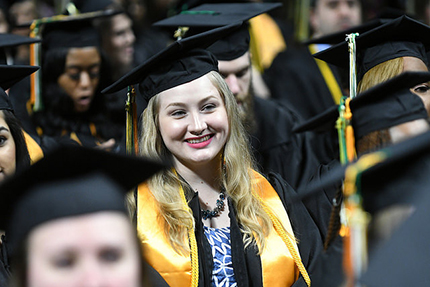Published on Sep 25, 2017 10:16am by Richard Rezler, Public Relations

Washtenaw Community College has changed the general education requirements in all of its associate degree programs to better align the college with the requirements of the Michigan Transfer Agreement.
A policy update, which will be effective beginning with the Fall 2018 semester, was approved by the WCC Board of Trustees at its September 2017 meeting.
“This will ensure that general education courses taken at WCC will transfer seamlessly to four-year programs across the state,” said Vice President of Instruction Dr. Kimberly Hurns. “We’re going to be helping more of our students complete a degree or certificate here at WCC before they transfer.”
The Michigan Transfer Agreement, implemented in 2014 at the request of the state legislature, improves the transferability of core college courses between the state’s 33 community colleges and its four-year institutions.
More than 70 percent of students entering WCC intend to transfer to a four-year institution.
A WCC committee studied potential changes to the college’s general education requirements for more than a year, including surveys and town hall meetings with the college’s faculty.
Most of the changes impact the 30 hours of general education courses required to earn an Associate in Arts (AA) or Associate in Science (AS) degree. They include:
- An increase in Natural Science credits from 4 to 7-8.
- A reduction in Writing credits from 6-7 to 3-4.
- Choice of a second Writing course (3-4 credits) or Speech (3-4 credits).
- Deletion of the 3 credit Computer and information Literacy requirement.
- Addition of a General Education elective to reach 30 credits.
Credit requirements in Mathematics (3-4), Social & Behavioral Science (6) and Arts & Humanities (6) remain the same.
“The changes also give the college’s departments more flexibility in creating the additional 30-credit requirements for their specific programs,” Hurns said. Many of the college’s articulation agreements with specific four-year institutions also have their own recommended courses, she noted.
Students who enrolled in a WCC associate degree program prior to Fall 2018 will have through Summer 2022 to complete their programs using the general education/core requirements of the programs in which they enrolled.
Students who change to a different program will have to fulfill the new general education requirements. As of the academic year beginning in Fall 2022, all degree students will be required to meet the new general education requirements to graduate.
Academic advisors and counselors will assist students in selecting appropriate courses and making a smooth transition.
###
[Media contact: Brendan Prebo, AVP Marketing & Communications, [email protected], 313-683-1155]
